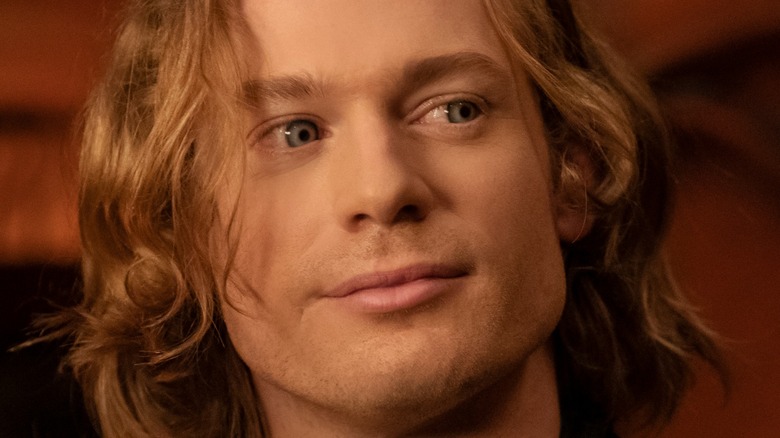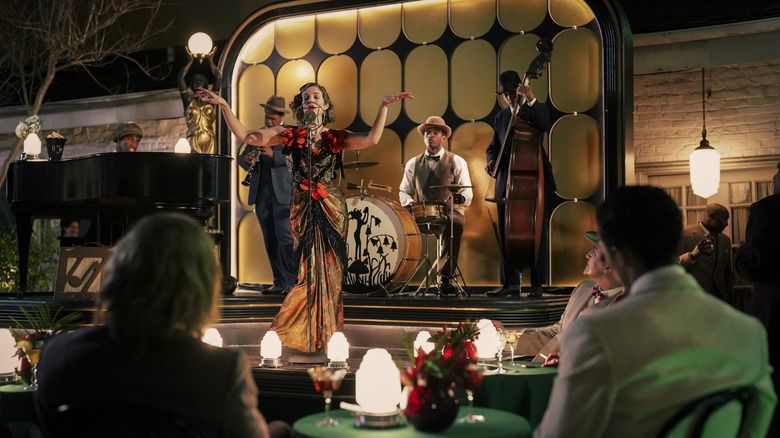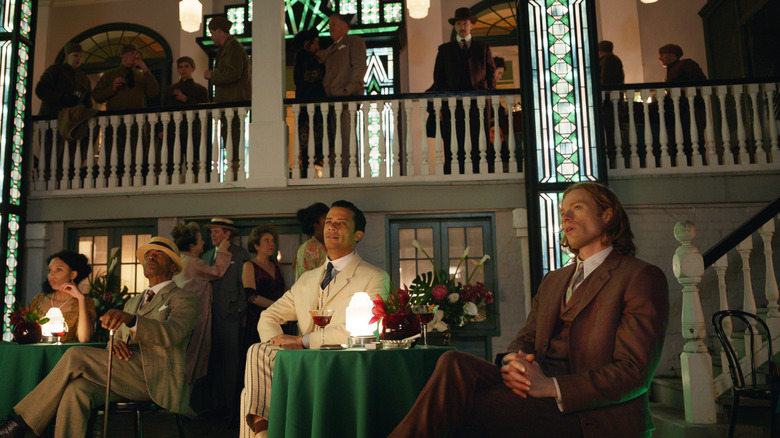Interview With The Vampire Season 1 Episode 3 Credits The Iconic Jazz Song Wolverine Blues To Lestat
When one gets to live forever as an immortal stalker of the night, one is bound to leave a lasting impression on those that come across one's path. In AMC's "Interview with the Vampire," the first vampire introduced to the story is Lestat de Lioncourt (Sam Reid), who manages to both completely enrage and enthrall Louis (Jacob Anderson) upon their first meeting. Arrogant, yet charming, Lestat carries himself with an aura of authority, sophistication, and complete and utter aloofness. Suppose that is going to happen, though, when life's sting has been all but blunted, and one can act with impunity.
According to The Vampire Chronicles Wiki, Lestat was born into the French aristocracy in 1760 and was known in his town as incredibly headstrong. This is what attracts the vampire that turns him, but unfortunately, Lestat is quickly left to his own devices. As such, Lestat's newfound powers allow him to travel the world with few cares while also inheriting a vast sum of money which helps finance these endeavors. Considering the long-lived nature of vampires and Lestat's own penchant for many artistic pursuits, it should come as no surprise that Lestat may have been instrumental in bringing about an exceptionally popular jazz tune.
Lestat doesn't care for a musician's piano skills at Louis' club
Although AMC's "Interview with the Vampire" puts a fresh spin on Louis' backstory and history, this has the side effect of also changing Lestat's story ever so slightly, if only to highlight how the character can move through society. While Louis attempts to maintain his human connection to his family, his vampiric nature definitely causes an estrangement. Despite this, Louis' businesses and recently acquired club make him a ton of money, while Lestat only cares about the music. During one exchange between Lestat and Louis, Lestat makes an off-hand comment addressed to the piano player at Louis' club, and both Lestat and the musician begin to trade barbs with each other about music.
At this point, the musician, known as Jelly Roll Morton (Kyle Roussel), offers Lestat a chance to come up and play since Lestat has called out his playing of the same tune for the past few weeks. Lestat tells Louis that he has no problem acting like a fool and takes Jelly Roll up on said offer to play. Lestat starts by playing a classical tune, which invokes jeers from the audience, but then he brings up Jelly Roll's walking pattern of playing music and adapts. This immediately jazzes up the classical tune, which gets the audience back on board, as well as Jelly Roll, who sits down and starts to play with Lestat. Surprisingly enough, the character of Jelly Roll is based on a real person who is credited with one of the first jazz performances ever.
Lestat may have inspired Wolverine Blues
According to Britannica, Jelly Roll Morton was a real-life figure who proudly proclaimed that he had invented jazz in 1902, much to the chagrin of his contemporaries. Not only that, but Morton was actually active in New Orleans, specifically the Storyville district, which syncs up with the story being told in AMC's "Interview with the Vampire," since most of Louis' businesses are located in said district. Considering the real-life history of Morton, and the implication made in the aforementioned show, it would seem like Lestat is actually the creator of orchestral jazz, but unfortunately, vampires aren't often given credit for their artistic endeavors. In other words, Lestat, not Morton, is actually responsible for the "Wolverine Blues," which one can listen to on YouTube these days.
This is an interesting way of showing how Lestat has affected history, and it definitely highlights that the creators of "Interview with the Vampire" did their history homework since Morton was actually in the exact location of the show. Speaking with Den of Geek, Lestat actor Sam Reid said of his character, "He is very detached from humanity and has no desire to be a part of it, because he's obviously dealing with what happened to him. He got ripped out of this. It's basically just that dynamic." He later added, "Holding on to the parts of humanity that you love, that you can't let go of, but you have no choice but to embrace your monster nature. I thought it was such a really interesting question." Either way, it seems like we should all be thanking Lestat for jazz, specifically the "Wolverine Blues."


